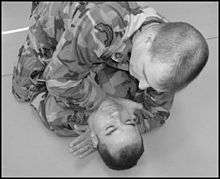Sode guruma jime
| Sode Guruma Jime | |
|---|---|
|
The top fighter wraps an arm behind his opponent's head and grabs his own sleeve to complete the choke. | |
| Classification | Katame-waza |
| Sub classification | Shime-waza |
| Targets | Throat |
| Kodokan | Yes |
| Technique name | |
| Rōmaji | Sode-guruma Jime |
| Japanese | 袖車絞め |
| English | Sleeve wheel choke |
Sode guruma jime (袖車絞め) ("sleeve wheel constriction") is a type of Judo chokehold (shime-waza), which compresses the opponent’s trachea or the carotid arteries. The technique can be executed from a variety of positions, but is generally performed by wrapping one arm behind the opponent’s head and grasping onto the sleeve of the gi with the opposite hand. While holding onto the sleeve for leverage, the opposite forearm is brought down across the throat and clinched tight. The choke is directly aided by the use of a gi but has also been adapted for no-gi application.
Brazilian Jiu-Jitsu

Sode guruma jime is widely known as an Ezequiel choke (Portuguese: estrangulamento Ezequiel) in Brazilian Jiu-Jitsu. The chokehold was renamed in memory of Ezequiel Paraguassu, a Brazilian judoka.[1][2] Paraguassu reportedly had difficulty in passing the guards of jiu-jitsu practitioners at Carlson Gracie's academy and instead, he had managed to use sode guruma jime successfully inside their guards.[1]
No-Gi Variation
Since the choke relies on the leverage created by the gripping of a sleeve, it must be altered slightly to be performed without a gi. Typically, this is accomplished by using the bottom arm to grip the opposite elbow or forearm. It can also be performed without a gi using the fist or wrist instead of the forearm.[3]
Notable uses in competition
- The technique has been used successfully in mixed martial arts competition by Hidehiko Yoshida, a 1992 Olympic gold medalist in judo.[4] Yoshida defeated Kiyoshi Tamura via sode guruma jime during Pride Total Elimination 2003, the opening round of Pride Fighting Championship’s 2003 grand prix. Yoshida also won a controversial decision over Royce Gracie at Pride Shockwave in 2002, when the referee thought Gracie had passed out from sode guruma jime.[5]
- Yoshihiro Akiyama defeated Katsuyori Shibata via sode guruma jime during Dream 5 the Lightweight Grand Prix Final Round 2008.[6]
- In 2009, Mark Staniszewski utilized a no-gi Ezekiel choke to defeat Jim Hannan in the finals of the Pan Jiu-Jitsu Championships; he defeated Steve Quinn in a heavyweight charity match-up and defeated Nicholas Gohn by Ezekiel to advance to the medal round at the USA Judo Nationals and World Team Trials. In 2012, Staniszewski defeated USA Judo's Ethan Stanley by Ezekiel choke at the Starrett Cup International.[7] [8]
- M-1 and Bellator Fighting Championships veteran and Russian Sambo practitioner Alexey Oleinik has won eight fights via Ezekiel choke.[9]
- Rani Yahya defeated Eben Kaneshiro by Ezekiel choke at UAGF: Kaos on Kampus on 20 May 2006.
Included systems
Systems:
Similar techniques, variants, and aliases
Also known as
- Ezequiel choke
- Ezekiel choke
- Sleeve wheel choke
- Sleeve choke
- Scissor choke
References
- 1 2 Conheça a história do golpe Ezequiel
- ↑ The MMA Encyclopedia, Ezequiel choke
- ↑ https://www.youtube.com/watch?v=TZfIQw6kabA
- ↑ http://www.sherdog.com/fighter/Hidehiko-Yoshida-5920
- ↑ http://www.fiveknuckles.com/mma-fighter/Hidehiko-Yoshida.html
- ↑ http://www.sherdog.com/fighter/Yoshihiro-Akiyama-11895
- ↑ "Long Island Press".
- ↑ "2009 USA Judo Nationals/World Team Trials".
- ↑ http://www.sherdog.com/fighter/Alexey-Oleinik-2027
External links
- Brazilian Jiu-Jitsu Ezekiel Choke
- Koji Komuro’s Ezekiel Choke (in Japanese)
- No-Gi Ezekiel Choke Tutorial
